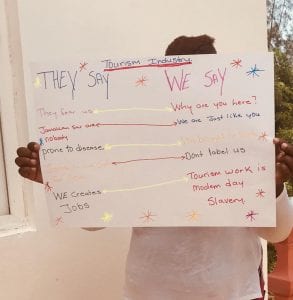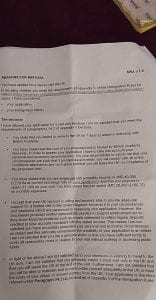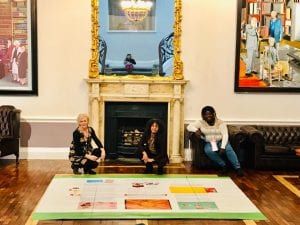By Harry Pitts
At first glance the UK’s current record of job creation seems impressive. But the numbers conceal more than they reveal. Self-employment represents an increasing amount of new jobs. Among these number those who have sought out self-employment to enjoy more freedom in where, how and when they work. But alongside them co-exist a vast expanse of gig workers whose legal status as ‘self-employed’ is mediated by platforms that connect customers with the providers of a service. The algorithmic control to which they are subject makes them just as compelled to work as any employee, with none of the security. Hence, this and similar situations have been labelled ‘false self-employment’ by some.
The self-employed workforce is therefore diverse, home to a range of motivations and experiences. There are certainly perceived and actual benefits to the independence it grants workers, often working in sectors where self-employment is a more appropriate way to deliver the specific kind of good or service produced. But this frequently comes at the expense of the security of workers and the stability of their income. Late payments are a major problem, with over half of invoices paid late by clients. Volatility of income negatively impacts upon the ability to get mortgages and loans.
Moreover, the introduction of the Universal Credit, with a monthly ‘Minimum Income Floor’ claimants must reach in order to be eligible for support, is set to exacerbate the consequences of income volatility for the several hundred thousand of self-employed people forecast to claim the benefit. Among these will be some of the least well-off and most precarious self-employed people, unable to evidence steady monthly income in line with the reporting criteria. The measure is currently subject to legal challenge, but it is important to remember that part of the initial impetus for the Universal Credit reforms was to drive people in unformalised, apparently unprofitable forms of work into more formalised, productive parts of the economy. It appears the Minimum Income Floor may serve to have this effect, at the risk of severe financial and personal discomfort to those on the receiving end.
Before Brexit came to occupy the legislative agenda, Theresa May’s premiership set out its stall on an agenda pitched to addressing the interests of workers. As part of this, and in recognition of some of the wider issues surrounding the formalisation of the self-employed as part of the architecture of British employment regulation, the government commissioned the Taylor Review. The Taylor Review proposed a number of recommendations for how the government could stimulate and support the creation of new platforms that, in a cooperative spin on the capitalist ethos driving their development as means of exploiting workers, bring independent workers together to organise for better pay, benefits and conditions. However, the report tends to focus on quite a individualised representation of the self-employed that overlooks the importance of collective responses to the issues they face.
More problematically, the Taylor Review advocated that in seeking to address the contradiction between security and autonomy among the self-employed in the UK, policy solutions should narrowly follow the path of a so-called ‘British Way’ distinctive to the specificities of the UK’s supposedly unique political economy, which Taylor perceived to possess sufficient dynamism to make it worth preserving. This appeal to a ‘British Way’, however, obscures the plenitude of practical examples already in evidence across the Channel among our possibly soon-to-be-former European partners. In countries such as Belgium and the Netherlands, in somewhat different political-economic contexts, social innovations responsible to the risks incurred by the self-employed are at a much more advanced stage of development.
Broodfonds, for instance, is a Dutch project that establishes a mutual fund into which independent workers pay a monthly sum, the accumulated commonwealth of which can be drawn down upon by those that fall out of work due to sickness or other factors and have no statutory right to the sick pay or other benefits afforded those with the legal status of employees. The scheme is organised around local branches and coordinated through a ‘platform cooperative’ model. Inspired by the Broodfonds, an organisation, Breadfunds UK, is currently exploring whether the slightly different structure of British financial regulation permits the implementation of such a scheme in the UK.
More extensive and interesting still is the SMart cooperative. Primarily based in Belgium but with branches in eight European countries, SMart is a platform that acts as a defacto ‘employer’ of its self-employed members. Rather than self-employed workers doing business with clients themselves, SMart invoices clients in their behalf any chases any late payments, in return for a percentage of the amount invoiced. It also guarantees those payments should clients fail to pay from a mutual guarantee fund similar to that found in the Broodfonds scheme.
SMart workers can manage their income through the SMart platform, drawing down what would otherwise be business income as a formal salary apportioned equally across months. This confers upon self-employed workers the legal status of employees with all the rights and access to benefits that flow from it. But it also enables them at the same time to enjoy the autonomy and independence of self-employment as a career choice, and mitigate some of the negatives of so-called ‘false’ self-employment in the gig economy.
An important aspect for the UK context is that the platform grants workers the ability to smooth out their income month-by-month, standing a potential solution to the problem of income volatility vis-à-vis the monthly reporting of the Minimum Income Floor for those self-employed people forecast to claim the Universal Credit.
There is already precedent for the presence of such intermediary institutions in the shape of the often exploitative ‘umbrella companies’ used to manage payroll on behalf of temporary workers and the agencies through which they are hired. The UK’s new Director of Labour Market Enforcement has set about to stamp out the abuses made possible in the latter. But SMart would represent a radical appropriation of a similar intermediary status within UK law.
Rather than further confusing the contested legal status of some forms of self-employed work under British employment regulation, the creation of a new category of what the Belgians call ‘SMart workers’ could serve to clarify it. SMart has become a semi-formalised part of the apparatus of employment relations in Belgium, and there is no substantial reason why a similar scheme could do the same in this country. Indeed, the Department for Work and Pensions have shown interest in the Business and Employment Cooperative model SMart represents.
A potential basis for experimenting with SMart in the UK may be Indycube.Community, a cooperative trade union for the self-employed established by Indycube, a co-working cooperative spreading out from South Wales to establish branches in a number of UK towns and cities, and the Community Union who, in the wake of the decline of the steel industry, adopted a new model of non-industrial organising more adept at accommodating the specific needs and demands of the self-employed than less agile UK trade unions.
Currently, Indycube.Community provides to members co-working space, invoice-chasing, financial and legal support and advice, and a campaigning voice for the representation of self-employed workers. It stands well-placed to begin bringing into reality aspects of the SMart model in the very different regulatory ad political space of the so-called ‘British Way’ of employment relations.
At a time where one half of Britain wishes to pull itself away from European institutions, it is essential to look across the water and learn from others what can be done to support real self-employment endowed with both autonomy and security, against the precariousness of its sometimes ‘false’ reality.
Harry Pitts is a Lecturer in Management in the Department of Management at the School of Economics, Finance and Management, University of Bristol, where he also leads the Faculty Research Group for Perspectives on Work.









